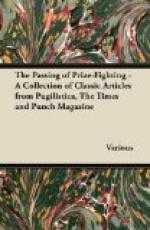* * * * *
[Illustration: FREEDOM RENEWS HER VOW. AUGUST 14, 1917.]
* * * * *
ESSENCE OF PARLIAMENT.
Monday, July 30th.—The obiter dicta dropped by Mr. BONAR LAW in the course of debate are gradually furnishing the House with an almost complete autobiography. To-day it learned that while, unlike Mr. BALFOUR, he reads a great many newspapers he does not include among them a certain financial organ which makes a speciality of spy-hunting in high places.
[Illustration: RAMSAY MACDONALD IN PARIS. “ARC DE TRIOMPHE! THE WORD HAS A SINISTER SOUND.”]
When the National Insurance Scheme was set on foot there were great complaints because some Friendly Societies were not allowed to share in its administration. Possibly the officials thought them a little too friendly in their ways. One of them, we learned to-day, employed an auditor who signed the return with a mark, like Bill Stumps; while another auditor had a habit of signing it in blank and leaving the secretary to fill in the figures.
Mr. ASQUITH used to allow his colleagues so much freedom of action that his Administration was nick-named “the Go-as-you-please Government”; and eventually it went as he did not please. But I cannot recall under his gentle rule anything quite so free-and-easy as Mr. HENDERSON’S visit to Paris. That a member of the War Cabinet should attend a Conference of French and Russian Socialists at all is in itself a sufficiently remarkable departure from Ministerial etiquette, but that he should be accompanied by Mr. RAMSAY MACDONALD, whose peculiar views upon the questions of war and peace have so recently been repudiated by the Government and the House of Commons, makes it still more extraordinary. In the circumstances it was almost surprising to learn that the complaisance of the Government did not extend to furnishing Mr. MACDONALD with a war-ship for his journey.
What Mr. BALFOUR, who is responsible for the foreign policy of this country, thinks about it all one can only surmise, for he said nothing directly on the subject in his great speech to-night—a speech which earned him the unique tribute of a compliment from Mr. PRINGLE. But the FOREIGN SECRETARY’S warning to the House not to try to anticipate the work of the Peace Congress may well have been inspired by apprehensions as to what the amateur diplomatists were saying at that moment in Paris.
Tuesday, July 31st.—An attempt to obtain further light on the HENDERSON-MACDONALD excursion met with little success. Mr. BONAR LAW professed to see nothing unusual in Mr. HENDERSON’S taking part in a Labour Conference, and declared, on the somewhat slender ground that only the Allies were represented, that it was not of an international character. Mr. HOGGE essayed to move the adjournment, but had omitted to have his motion ready. The result of his hurried effort to draft one was not satisfactory, for the SPEAKER ruled that it constituted an attack on Mr. HENDERSON and ought not in fairness to be moved until the right hon. gentleman was back in his place. So the Government escaped—for the moment.




